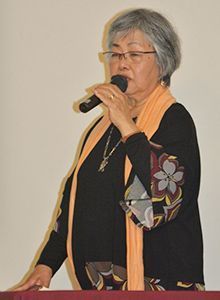OWAAMV’s Takazato explains WWII-era framework of sexual violence still exists in Okinawa

On January 12 at Haebaru Cultural Center in Haebaru Town, Suzuyo Takazato of Okinawa Women Act Against Military Violence talked about how sexual violence starting with the Battle of Okinawa continues today.
OWAAMV’s Takazato explains WWII-era framework of sexual violence still exists in Okinawa
January 16, 2019 Ryukyu Shimpo
On January 12, a civic public lecture organized by the Battle of Okinawa and Mental Health Research Association titled, “Another Battle of Okinawa—Facing Sexual Violence after the War” was held at the Haebaru Cultural Center in Haebaru Town. A representative of Okinawa Women Act Against Military Violence (OWAAMV), Suzuyo Takazato, and others brought up problems involving comfort women during the battle and sexual offenses related to the concentration of U.S. military bases in Okinawa. Takazato said, “There is prejudice [against Okinawans] among societal leaders and in the training of the U.S. military.” She also mentioned that, “Okinawa is still dangerous.”
Takazato pointed out that there were 145 comfort stations in Okinawa that the Japanese army set up. She said, “It was ‘a new war’ called sexual attacks” of the Japanese army and U.S. army. Sexual violence by the U.S. military began immediately after they landed, and “All residents including men and children were frightened by the violence.” Takazato also scoured records including local municipalities’ histories and newspaper articles, collecting testimonies from victims and sharing them with her audience. She explained that the residents who witnessed sexual assaults also suffered, because they were unable to save those being assaulted.
In regard to the background of continued sexual violence related to the US military bases in Okinawa, Takazato pointed out that prejudice remains deeply rooted in both the U.S. military and in Japanese society. “We must listen to the voices of the victims. We must reveal past sexual violence.” In addition, she appealed for revision of the Japan-U.S. Status of Forces Agreement and stressed that she would not allow the construction of a new base in Henoko, Nago City. Akiko Mori of Doshisha University’s Amami-Okinawa-Ryukyu Research Center of also gave a lecture.
(English translation by T&CT and Megumi Chibana)
Previous Article:Amami, Okinawa to re-nominate world heritage sites for review next summer
Next Article:Ishigaki GSDF post construction will start March 1 to evade environmental impact assessments
[Similar Articles]
- 25 women’s groups in Okinawa criticize Hashimoto’s remarks on comfort women
- Rally meets in Tokyo protesting ongoing acts of sexual violence by U.S. military personnel
- Former comfort woman rebuts Hashimoto’s remarks
- [Editorial] Testimonies prove “comfort women” recruited by force
- Protest gathering to body-dumping incident calls for withdrawal of all US bases from Okinawa
 Webcam(Kokusai Street)
Webcam(Kokusai Street)


